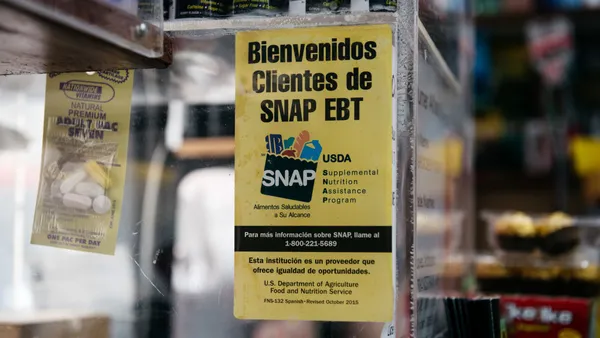Dive Brief:
- Whole Foods Market intends to settle a lawsuit filed by a former worker who alleged the company retaliated against her for protesting its policy of disciplining workers who wore masks that bore the “Black Lives Matter” message, according to a letter from Whole Foods’ attorney to a judge filed July 22.
- The retaliation lawsuit was the sole surviving claim from a more expansive class-action lawsuit filed in July 2020. In February 2021, the judge on the case dismissed the discrimination charges but allowed a single worker’s retaliation charge to proceed. Two other, similarly terminated workers joined the lawsuit shortly thereafter.
- Details of the planned settlement were not disclosed and may still be under discussion. “The parties are in the process of finalizing a formal settlement agreement,” Morgan Lewis attorney Julie Silva Palmer wrote in the letter.
Dive Insight:
The proposed settlement appears to put an end to a four-year-long lawsuit that was headed for trial in less than a month.
The original lawsuit charged discrimination alongside retaliation claims under the Civil Rights Act of 1964, with the plaintiffs arguing that the policy of selectively enforcing its dress code when it came to Black Lives Matter messaging — while allowing masks bearing messages in support of LGBTQ+ rights, the National Rifle Association and other interests — adversely affected Black employees.
In considering Whole Foods’ motion to dismiss the charges, however, Judge Allison Burroughs found the discrimination charge did not stand up in court. The workers could not show Whole Foods “disciplined them because of their race or applied the Policy differently based on the race of employees violating it, or that Defendants’ application of the Policy had a disproportionate impact on employees of any particular race.”
On the other hand, the terminated employee “alleged facts sufficient to plausibly infer that her termination was causally linked to protected activity,” Burroughs wrote, noting that the worker led employee protests and wore a BLM mask in opposition to the policy and that she filed charges with the U.S. Equal Employment Opportunity Commission and the National Labor Relations Board.
Two other workers who joined the surviving retaliation claim also said they were fired for wearing masks wearing BLM messaging and for related activities.
In December, an NLRB administrative law judge sided with Whole Foods, finding that BLM masks were not protected by the National Labor Relations Act because they were unrelated to the jobs in question. The decision was in conflict with NLRB General Counsel Jennifer Abbruzzo’s own opinion on the case.
Employers have contended with a number of lawsuits and complaints related to political messaging at work in recent years; Home Depot faced its own NLRB complaint related to the Black Lives Matter movement when it terminated an employee for refusing to remove the messaging from their work apron. In that case, the board sided with the worker, finding the action was tied to previous employee protests about racial discrimination in the workplace and employees’ working conditions.
On the other side of the coin, employers have also faced worker refusal to don uniforms that promote or appear to promote certain messaging. Kroger faced a religious discrimination lawsuit filed in 2020 by the EEOC, in which workers alleged its four-color heart logo represented a rainbow in support of LGBTQ+ rights — and that in refusing to allow them not to wear the logo, Kroger was failing to accommodate their religious beliefs. The grocer paid $180,000 to settle the lawsuit in October 2022.














